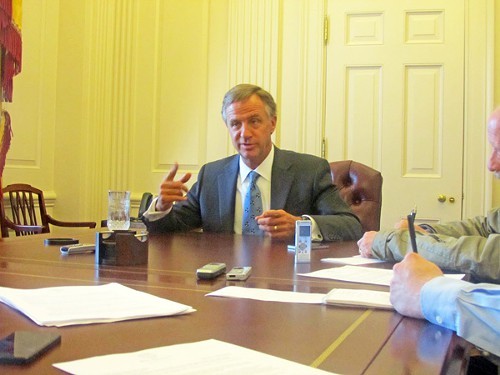 JB
JB
State Reps. Ron Lollar and Jim Coley meet with members of the Republican Women of Purpose.
For what it’s worth, Governor Bill Haslam’s “Insure Tennessee” plan for Medicaid (TennCare) expansion may not go down that well with Republican legislators from Shelby County. Speaking at a luncheon meeting of the Republican Women of Purpose on Wednesday at the ballroom of Southwind TPC, several of them weighed in on the matter.
Predictably, perhaps, state Senator Brian Kelsey, an opponent of Medicaid expansion per se, insisted Republicans needed to “shrink the size of government., not…expand the size of government” and cast doubt as to whether the federal government would or the state Hospital Association could pay its pledged share in two years’ time.
State Rep. Jim Coley lamented the plan’s “dependence on the federal government” and said he “hope[d] to persuade the Governor this is not the most appropriate plan.”
State Rep. Steve McManus said it might not be so easy to opt out of the plan after two years as Haslam suggests. He contends that the U.S. Department of Health and Human Services might withhold Medicaid funds entirely as retribution. “It’s like Hotel California,” he said, meaning that once you check into the plan, you can never leave.
State Rep. Curry Todd prophesied “a lot of bloodletting” in the special session regarding the plan, scheduled to begin February 2.
Coley and Todd were alarmed about the prospect of both a state and a federal gasoline tax and implied criticism of Senator Bob Corker for proposing the latter.
*On other matters, state Rep. Ron Lollar said he was “concerned about our leadership welcoming President Obama to Knoxville on Friday” and further concerned “about what we’re buying into” as a result. While most of the legislators expressed reservations about Common Core, state Rep. Mark White made a point of saying he was open-minded on the subject, that it was important to assert educational standards.
*Another issue brought up by the legislators — especially Kelsey and White – was the possibility of de-annexation legislation. Southwind has just been annexed by Memphis. (On Thursday, incidentally, a Tennessee Court of Appeals ruled that Chancellor Jim Kyle, who recently denied a restraining order on the annexation, should not have heard the case because of leftover litigation he was still handling on behalf of the City of Memphis.)


